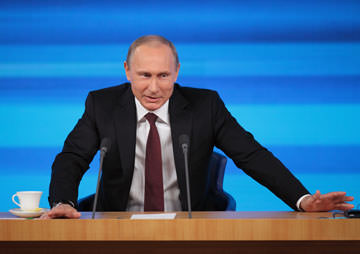Before Crimea There Was Iraq, Afghanistan, Panama, Grenada and So On
Even as Washington condemns Moscow for its outrageous aggression, we reserve the right to fire deadly missiles into Pakistan, Yemen, Somalia and who knows where else. ID1974 / Shutterstock.com
ID1974 / Shutterstock.com
Let’s be real. It’s one thing to say that Russia’s takeover of the Crimean Peninsula “cannot be allowed to stand,” as many foreign policy sages have proclaimed. It’s quite another to do something about it.
Is it just me, or does the rhetoric about the crisis in Ukraine sound as if all of Washington is suffering from amnesia? We’re supposed to be shocked — shocked! — that a great military power would cook up a pretext to invade a smaller, weaker nation? I’m sorry, but has everyone forgotten the unfortunate events in Iraq a few years ago?
My sentiments, to be clear, are with the legitimate Ukrainian government, not with the neo-imperialist regime in Russia. But the United States, frankly, has limited standing to insist on absolute respect for the territorial integrity of sovereign states.
Before Iraq there was Afghanistan, there was the Gulf War, there was Panama, there was Grenada. And even as we condemn Moscow for its outrageous aggression, we reserve the right to fire deadly missiles into Pakistan, Yemen, Somalia and who knows where else.
None of this gives Russian President Vladimir Putin the right to pluck Crimea from the rest of Ukraine and effectively reincorporate the historic peninsula into the Russian empire. But it’s hard to base U.S. objections on principle — even if Putin’s claim that Russian nationals in Crimea were somehow being threatened turn out to be as hollow as the Bush administration’s claim that Saddam Hussein had weapons of mass destruction.
The Obama administration has been clear in its condemnation of Putin’s operation. Critics who blame the Russian action on “weak” or “feckless” U.S. foreign policy are being either cynical or clueless.
It is meaningless to rattle sabers if the whole world knows you have no intention of using them. There is no credible military threat by the United States that could conceivably force Putin to surrender Crimea if he doesn’t want to. Russia is much diminished from the Soviet era but remains a superpower whose nuclear arsenal poses an existential threat to any adversary. There are only a few nations that cannot be coerced by, say, the sudden appearance of a U.S. aircraft carrier group on the horizon. Russia is one of them.
If the goal is to persuade Russia to give Crimea back — which may or may not be possible — the first necessary step is to try to understand why Putin grabbed it in the first place.
When Ukraine emerged as a sovereign state from the breakup of the Soviet Union, it was agreed that the Russian navy would retain its bases on the Crimean Peninsula. After Viktor Yanukovych, Ukraine’s pro-Russian president, was deposed by a “people power” revolution, it was perhaps inevitable that Putin would believe the status of those bases was in question, if not under threat.
The new government in Kiev could offer formal reassurances about the Russian naval base in Sevastopol. More broadly, however, Putin may have decided that allowing Ukraine to escape Moscow’s orbit was too much to swallow. Seizing Crimea does more than secure a warm-water port for Russian ships. It implies the threat of further territorial incursions — unless the new government becomes more accommodating to its powerful neighbor.
This is not fair to Ukraine. But I don’t believe it helps the Ukrainians to pretend that there’s a way to make Putin surrender Crimea if he wants to keep it.
The question is whether there is any way to tip the balance of Putin’s cost-benefit analysis. The Russian leader has nothing to fear from the U.N. Security Council, since Russia can veto any proposed action. Kicking Russia out of the G-8 group of leading industrialized nations would be a blow to Moscow’s prestige, but probably would not cause Putin to lose much sleep.
Economic sanctions are more easily threatened than actually applied. The European Union depends on Russia for much of its natural gas — a fact that gives Putin considerable leverage. In a broader sense, there is zero enthusiasm in Europe for a reprise of the Cold War. Putin knows this.
If Putin really has lost touch with reality, as German Chancellor Angela Merkel reportedly speculated in a conversation with President Obama, then all bets are off. But if Putin is being smart, he will offer a solution: Russia gets sole or joint possession of Crimea. Ukraine and the other former Soviet republics remember that Moscow is watching, and we all settle down.
Sadly for Ukraine, but realistically, that may be a deal the world decides to accept.
Eugene Robinson’s e-mail address is eugenerobinson(at)washpost.com.
© 2014, Washington Post Writers Group
Your support matters…Independent journalism is under threat and overshadowed by heavily funded mainstream media.
You can help level the playing field. Become a member.
Your tax-deductible contribution keeps us digging beneath the headlines to give you thought-provoking, investigative reporting and analysis that unearths what's really happening- without compromise.
Give today to support our courageous, independent journalists.






You need to be a supporter to comment.
There are currently no responses to this article.
Be the first to respond.